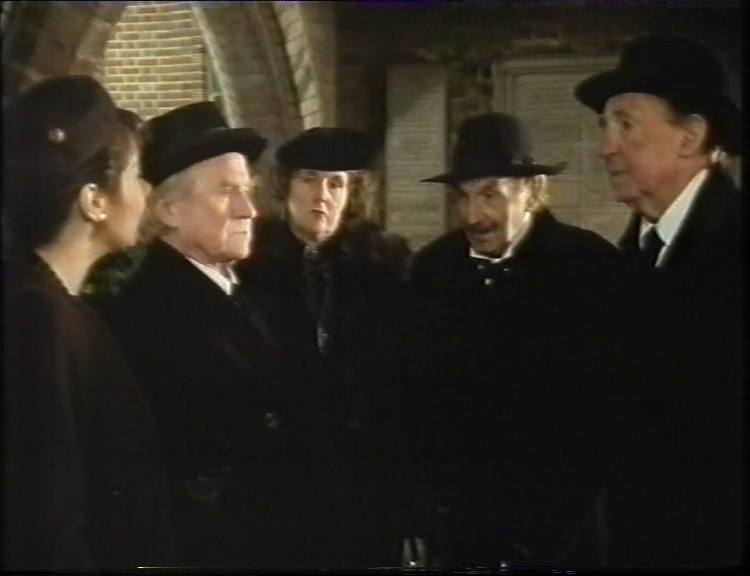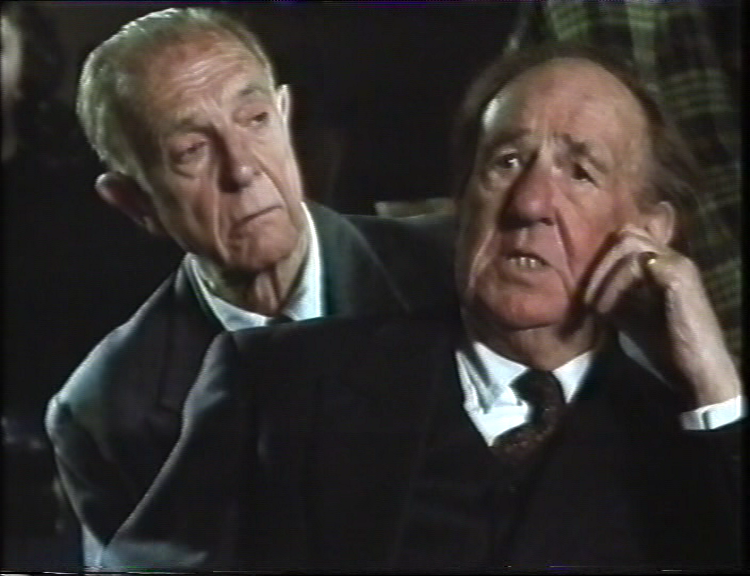
"It's hard for people our age to think about dying. Perhaps we should have got into the habit when we were young."
A dissolve from the dial of an old-fashioned clock to the dial of an old-fashioned telephone.
When Val Lewton was preparing Isle of the Dead, one of his grimmest and most poetic horror films, an RKO executive reminded him that the studio had decided that its films should not have messages. "I'm sorry to say that your film does have a message," Lewton said, "and the message is, 'Death is Good.'"
In this light, Jack Clayton's final film, Memento Mori, can be seen as an exercise in redundancy, since it helpfully includes it's message in the title, for anyone with the classical background to understand it. But of course a message is not, or should not, be the whole point of a movie. Those much derided things ("Messages are for Western Union" —Sam Goldwyn, "I always laugh at films with messages" —Claude Chabrol) are effective only if the film makes you feel them in a poetic way which cannot be entirely boiled down to a sound bite, even if it appears as if it already has been.
Anyhow, the title is pretty central to this film, based on Muriel Spark's book. "Remember you must die," says the anonymous voice on the telephone, ringing up various aged parties in the London literary set. Naturally, the assumption is that one of the group is responsible, since the literary scene, then as now, is a vespiary of jealousy, grudges and petty hatred. It's not exactly clear that any crime has been committed, but ex-inspector Henry Mortimer (John Wood) is put on the "case," since he's the right age for talking to this crusty and suspicious crowd.
His problem is that while he's used to thinking about things in the straight-forward terms of motivation and cause and effect, all his witnesses are poets and authors, more inclined to react emotionally or on abstractions. But, as it turns out, this might be the best way to handle the case.
On the other hand, gathering the victims/suspects together is tricky, since half haven't spoken to the other half for twenty years and are just starting to enjoy their sulk. And when more than three gather in one place at a time, somebody will usually spill their tea and then everybody will start shouting...

Above: About three hundred years of acting talent in one frame. Zoe Wanamaker, Cyril Cusack, Stephanie Cole, Maurice Denham and Michael Hordern.
"Maybe he thought we needed to be reminded?"
Clayton, who was in his seventies, may well have suspected this would be his last film, but rather than cramming it with every remaining trick he hadn't tried yet, he seems to have relaxed and let the story lead him where it would. The fact that he was suffering from flu through most of the shoot couldn't have helped. So the movie, made for television, is easily mistaken for a TV play in the BBC's fine tradition of slightly stodgy, worthy productions. It's a little more subversive and intelligent than that, however.
Wood, in what is nominally the lead role of the detective story (really, the film is an ensemble piece), is actually one of the least familiar presences in it, but he's delightful. The film's depiction of the British police as gentle, deferential and utterly benevolent is quite in keeping with its 1950s setting, not because the police were ever really like that (I'm sure some were, but we're talking about a human institution here), but because that's the way the middle class regarded the coppers in those days.

Above: Maggie Smith.
"Fellow must be losing his faculties."
At age sixty-two, Wood (happily still with us today at eighty) is a mere stripling compared to some of his fellow players. Michael Hordern, as a gruff philanderer, was born in 1911, as was Thora Hird. Maurice Denham in 1909. All three of them could trace their careers back to Ealing Studios productions: a young Thora can be seen shooting German soldiers in Cavalcanti's Went the Day Well? (1942). Cyril Cusack, born in 1910, made his screen debut in 1918, and worked regularly for Powell & Pressburger in the late 1940s.
The top-billed thesp is Maggie Smith, almost the baby of the cast, who had a strong history with both Spark (The Prime of Miss Jean Brodie) and Clayton. Clayton's The Pumpkin Eater (1964, scripted by Pinter) was one of Dame Maggie's earliest movie roles, and in The Lonely Passion of Judith Hearne (1987), she gives possibly the greatest performance by anyone, ever (and regular readers will know that I despise hyperbole more than any man who's ever lived). Here, she's deliciously evil in a Bette Davis kind of way, scheming, manipulative, a slut, a blackmailer, a poisoner and a smiling sadist. Longing for her to get her comeuppance drives you deep into the story.

Above: Michael Hordern, who has the unique trait of being jowl from the eyes down. And he can express any emotion, from indignation to sexual arousal, with a confused cough. So, quite naturally, he does so whenever possible.
"You mean this isn't the Over-Seventies Happiness Society? Then all I can tell you is you have some very peculiar friends."
The real subject here is old age as much as it is death, and the two may be connected but they're certainly not the same. Old age is one of the most interesting subjects, and it's certainly one we need to see addressed by our older filmmakers, because they're the ones who know what it's like. It's kind of a shame that commercial pressures often force aging directors to tell stories about the young. Spark and Clayton's oldsters are cantankerous, forgetful, bitter, and flirting with dementia, although those who appear closest to it may have more on the ball than their patronizing friends and spouses. They're also very much alive, animated by the same snobbery and self-importance that must have fueled many of their youthful exploits, although now they've become caricatures of themselves as they carry on old enmities and affairs out of unquestioned habit. It's a pretty scathing view of senescence, on the face of it. On the other hand, the vices and follies of this crowd were all forged in their young days.

Above: Screen legend and Alan Bennett favourite Thora Hurd, who never seems to act at all.
"All the same, there's something about them, I don't know... a sort of stubborn gallantry? Echoes of a romantic and glamorous past..."
With its period setting, literary source and beautiful Georges Delerue score, the movie fits right into Clayton's oeuvre, and one other element binds it securely to his cinematic world: the supernatural. Clayton's cinema delves into the paranormal with surprising frequency, considering that he's a very English filmmaker, and not connected to Hammer studios in any way. It's a rather astringent form of fantasy he explores, where magic is never the solution to life's problems, but rather a complicating factor or a symptom of more mundane worries. In The Bespoke Overcoat and The Innocents, Clayton put very solid, yet eerie and ambiguous ghosts on the screen, figures who could be symptoms of a guilty conscience or a suppressed sexuality erupting in hysteria, but who nevertheless have dimensionality and apparently personality of their own. In the desperately underrated and studio-butchered Something Wicked This Way Comes, Ray Bradbury's "Autumn People" are like spiritual vampires, feasting on human weakness and sorrow. Defeated at the film's end, they seem unlikely to cease their operations altogether: a traveling carnival, they most likely just move on to the next town.
In Memento Mori, there's an obvious spoiler to be avoided: I don't want to give away the identity of the mystery caller, but then, this isn't a fair-play detective story of the Agatha Christie school. Myabe you shouldn't read on.
Really, the voice on the telephone is coming from somewhere outwith the film...Have you heard of Konstantin Raudive? He turned on a tape recorder in a room with an untuned radio buzzing away, and when he played back the tape he found voices that hadn't been audible during the live recording. He thought they were the voices of the dead. Something similar but opposite happens in this movie, for when the police record one of the anonymous calls, they get nothing but silence, save for the responses of the person called. Who is the mysterious, anonymous, unrecordable caller?
I once had the pleasure of asking David Lynch about the black-clad Mystery Man played by Robert Blake in Lost Highway (1997). Of course, he didn't clear up the mystery: you wouldn't expect him to. But he did say one striking thing:
"Well, he's someone we've all met."
The closing credits end. A phone rings. A modern, up-to-date one. Now who might that be?
***
The Forgotten is a regular Thursday column by David Cairns, author of Shadowplay.